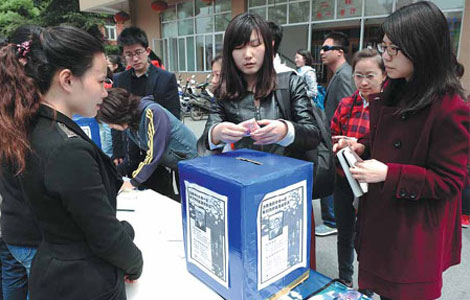Online tax regulation discussed in China
Updated: 2013-05-08 15:20
By Mao Jing (Chinadaily.com.cn)
|
|||||||||||
On Monday, the US Senate approved the online sales tax bill, the Market Fairness Act, and it spurred discussions about tax legislation on e-commerce in China, Daily Economic News reported.
Under current US law, only when a retailer has a physical store in the state can the state government require a sales tax. For instance, Wal-Mart, Best Buy and other large retailers must pay sales tax when selling goods online, while eBay, Amazon and other online retailers don’t.
According to the Market Fairness Act, enterprises selling products via the Internet, mail order, telephone and television must pay sales tax. But small businesses with annual sales of less than $1 million enjoy immunity.
Wang Ningyuan, an investment advisor, said that online selling is also a kind of commercial practice and it has no essential difference from offline selling. So taxing online retailers is reasonable and an inevitable trend. But online sales tax will increase the overall cost of e-commerce, hence the negative impact on the performance of online retailers in the market, he added.
“Once the Fair Market Act becomes part of the existing law of the US, it will serve China as a reference, though it has not been put on the timetable yet,” said Zhao Zhanling, a lawyer from Beijing Huicheng Law Firm.
Zhang Jindong, chairman of Suning Commerce Group, had proposed levying a tax on e-commerce during the NPC and CPPCC sessions earlier this year.
In general, there are two modes of e-commerce: B2C (business to customer) and C2C (customer to customer). “China has yet to require C2C mode to apply for business registration and pay taxes. So it is very likely that sellers engaged in B2C transactions are covered up by C2C mode to avoid taxes,” Zhao said.
Zhao also expressed some concerns about taxation on C2C business. He pointed out that levying by government may reduce the number of individual online sellers, especially non-profit ones who only sell their own used goods. It will also raise the threshold for many small new enterprises. What is more, the tax burden will finally be shifted onto buyers, which would greatly reduce the price advantage of online shopping.
Today's Top News
Washington reaffirms defense of ROK
Indian FM kicks off 2-day China visit
China, Israel boost social, economic cooperation
Li calls for sound agriculture
Govt environmental transparency in doubt
Monorail to ease Shanghai's congestion
Bone marrow program to 'spread gifts of life'
Tollway firms may get OK to collect longer
Hot Topics
Lunar probe , China growth forecasts, Emission rules get tougher, China seen through 'colored lens', International board,
Editor's Picks

|

|

|

|

|

|





